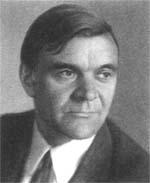presents:
AN ARTIST WHO HAS ENRICHED THE WORLD
by
Yuri Bondarev
M.A. Sholokhov's 107th Birthday, 24 May 2012. |
presents:
AN ARTIST WHO HAS ENRICHED THE WORLD
by
Yuri Bondarev
from 107 Years of Sholokhov, a SovLit.net celebration in honor of
M.A. Sholokhov's 107th Birthday, 24 May 2012.
 Yuri Bondarev |
|
107 Years of Sholokhov |
